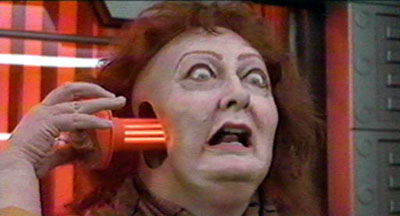Dick's Ubik Coming to the Big Screen
Variety reported yesterday that our brains may soon be melted by another Philip K. Dick story on the big screen. This time around, it's "Ubik," regarded by many as Dick's master work, getting the film treatment. The cinematic effort will be produced by Celluloid Dreams, and Dick's daughter will be intimately involved. Celluloid Dreams has been responsible for several recent critical successes including "Persepolis," "Son of Rambow," and this year's "Funny Games" reboot.
Dreams' involvement should assuage the fears of any die-hard Dick fans concerned that "Ubik" might be getting a higher-concept gloss (hopefully everyone learned their lesson with "Next"). "Ubik" is one of four novels collected in a recently released Library of America volume; a publishing honor bestowed on only the finest authors. That book's announcement, a little over a year ago, elevated Dick, who had long been left out of the critical canon for his perception as a pulp or genre writer, to the same level as previous American masters. When Time magazine compiled a list of their top 100 English-language novels of the modern era, "Ubik" made the cut, and I'd be willing to be that it's the only selection to feature psychics involved in corporate intrigue on the moon.

"Ubik," which tells the story... actually, screw it, just read the Wikipedia page, it's about as crazy as you would imagine. Which of course is the problem with translating Philip K. Dick's work to film. The man writes fevered dreams of psychadelia, where the line between reality and imagination typically disappears by the midpoint. Creating a coherent visual narrative, while at the same time remaining true to Dick's original intentions, is often very challenging. That being said, most Dick-related adaptations have met with some success. Films like "Blade Runner," "Total Recall," and "Minority Report," all succeed to varying degrees by adhering to their source material while injecting action and suspense. Others, like the more recent "Scanner Darkly," go experimental with their cinematography in an attempt to approximate the experience of reading Dick.
We probably won't be seeing "Ubik" till sometime in 2010, but for the uninitiated, I'd highly recommend this look back at Dick's work. As a starting point "The Man in the High Castle" might be your best bet—it's included in the Library of America volume. There's also several excellent short story collections that will surely do when you're looking for that acid trip experience without the actual acid.

